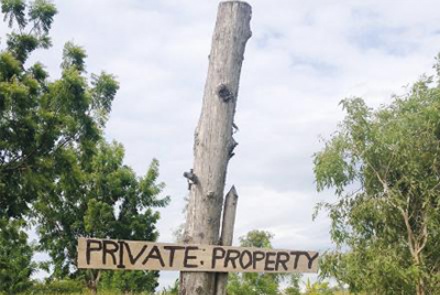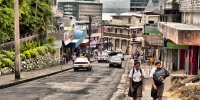
Kastom, Property and Ideology: Land Transformations in Melanesia
Uncovering a scandal?
Politics in Papua New Guinea has been rocked in recent years by a series of land-deal scandals, especially the so-called ‘special agricultural and business leases’ on which Crawford School’s Colin Filer has written several papers. Could one of Crawford’s student alumni have now discovered another one?
Logea Nao is the lead researcher on a piece of investigative work raising important questions about a government-sponsored land relocation near Port Moresby.
The paper is titled ‘Is Konebada Petroleum Park Authority a scam?’ and was published by The National Research Institute (NRI), Papua New Guinea’s leading public policy think-tank in April.
Logea Nao and fellow authors Belden Endekra and Lucy Hamago call attention to an issue of the PNG Government’s National Gazette published in February this year. They write that in the Gazette, the Minister for Lands and Physical Planning declared that over 23,000 hectares of customary and business community land in the National Capital District (Port Moresby) is to fall under the administration of a statutory body known as the Konebada Petroleum Park Authority (KPPA).
The paper raises a number of questions over the purpose of the KPPA and the consultation process behind the land reallocation.
Their research has already attracted the attention of media in the region, including coverage by PNG newspaper The National, Pacific news outlet Loop, and a radio interview with ABC’s Pacific Beat. The Lands Minister has recently declared that the Konebada Petroleum Park is nothing more than a ‘free trade zone’ designed to ‘assist investors and landowners’, but landowner representatives have countered that it is ‘an intrusion of their customary land by the Government without proper consultation and regard for their interests and rights’.
The initial NRI publication last month has since been followed by a clarification from the Minister involved, which in turn has prompted a second paper by Logea Nao and fellow authors. The ongoing story continues to receive national press coverage in Papua New Guinea.
Logea Nao graduated from Crawford’s Master of International and Development Economics program last year, but she is not the only member of the National Research Institute who hails from Crawford. Institute Director Dr Charles Yala also received his PhD in economics from Crawford, when it was known as the National Centre of Development Studies.
For those interested in the topic of land rights and transformation in Melanesia, a new book has been published today on the subject by the State, Society and Governance in Melanesia (SSGM) program. Titled Kastom, Property and Ideology, the book is edited by Siobhan McDonnell, Matthew Allen and Colin Filer, who are launching it today in Canberra and later in Papua New Guinea. Apart from chapters by Colin, it also includes a chapter on land dealings in Port Moresby by Michelle Rooney from Crawford’s Development Policy Centre.
Updated: 13 July 2024/Responsible Officer: Crawford Engagement/Page Contact: CAP Web Team













